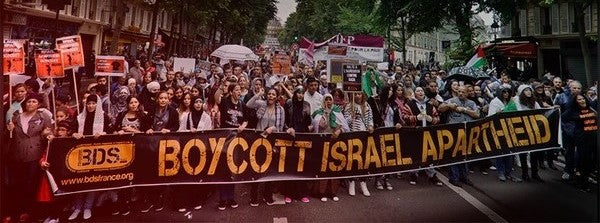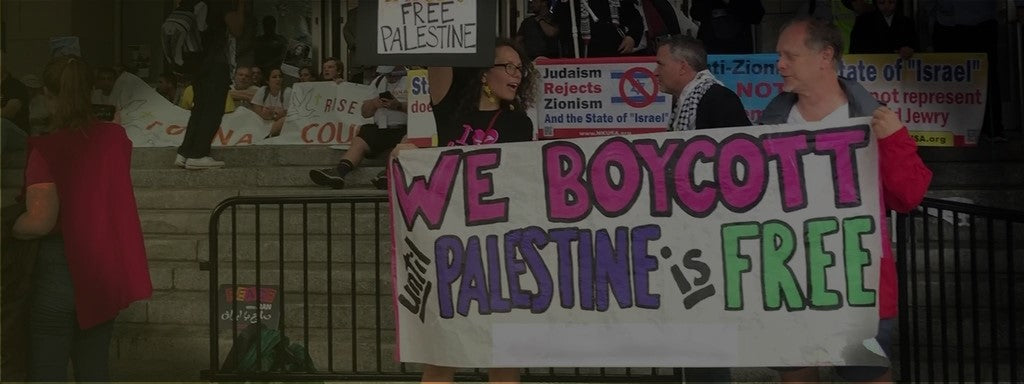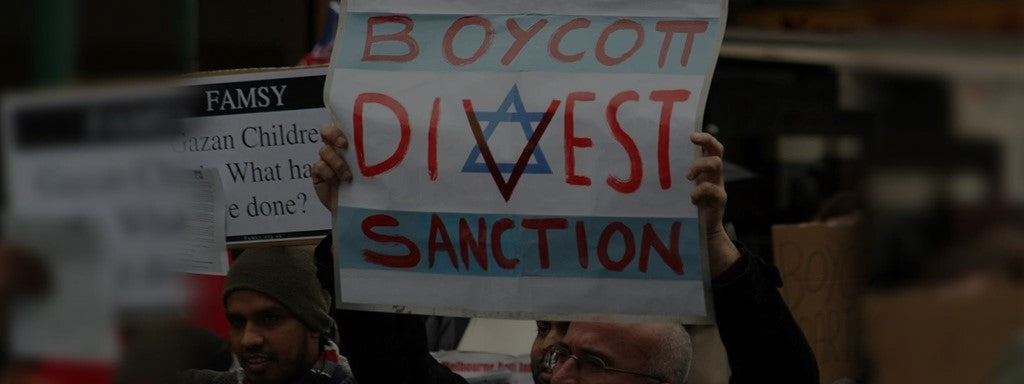BDS:
- Boycott: To abstain from buying from Israeli companies, or companies that do business with Israel. Lobbying for artists and musicians not to perform in Israel.
- Divest: Remove investments from Israeli companies and from companies that do business with or in Israel.
- Sanction: Government limits on Israeli imports and exports and arms embargoes to limit Israel's ability to defend itself.
The BDS movement began in the early 2000s with the goal of isolating Israel economically, culturally, and politically. But the use of boycotts against the Jewish community goes back over 80 years.
In 1933, Nazi Germany announced the boycott of Jewish owned businesses. On April 1,the beginning of the boycott,
Storm Troopers… stood menacingly in front of Jewish-owned department stores and retail establishments, and the offices of professionals such as doctors and lawyers. The Star of David was painted in yellow and black across thousands of doors and windows, with accompanying antisemitic slogans. Signs were posted saying "Don't Buy from Jews" and "The Jews Are Our Misfortune." Throughout Germany, acts of violence against individual Jews and Jewish property occurred; the police intervened only rarely. —From Jewish Virtual Library

Nazis post a sign on a dress shop reading "Germans! Defend yourselves! Do not buy from Jews!"
It was the first of several steps that eventually led to the attempted genocide of European Jewry.
After the Holocaust, many more Jews immigrated to the Land of Israel. Once there however, they faced fresh challenges. In 1945, the Arab League announced that it would boycott the Jewish community in Israel. This boycott was part of their plan to prevent the establishment of a Jewish state and then, when Israel was established, to destroy it. Today, most of the Arab nations have little or no diplomatic relations with Israel and still engage in boycotts.
In the 71 years since its establishment, Israel has emerged as a powerhouse of technological advances and innovation. It has brought much good to the world in fields like medicine and agriculture. Yet its enemies have always been active, launching wars against the Jewish State and perpetrating terrorist attacks against Jews. Through all of these attempts at annihilation, Israel has emerged victorious—stronger even.
The BDS movement was started as an attempt to isolate and strangle Israel economically in ways that violence and terrorism couldn’t.
In 2001, at a UN organized event, nations gathered in Durban, South Africa, for a conference against racism. A draft document equating Zionism with racism that was expected to be passed at the conference caused Israel and the US to withdraw. The final Declaration and Programme of Action of the conference did not contain the anti-Israel text, but at the same time, disturbing events had taken place at a parallel conference—the World Conference's Non-Governmental Organization (NGO) forum. Eight thousand representatives of more than three thousand NGOs gathered, gaining more media attention and coverage than the actual UN conference. This 5-day event ended with ‘a declaration that branded Israel a "racist apartheid state" guilty of "war crimes, acts of genocide and ethnic cleansing".’
The declaration also called for “the establishment of a U.N. committee to prosecute Israeli war crimes and the complete isolation of Israel as an apartheid state.”
Soon after this, boycotts and divestments of Israel began at US colleges and universities, mainline Protestant churches, and cities and unions across the world.
In 2005, the BDS National Committee was created in order to organize the movement. One of the co-founders of this committee, Omar Barghouti, made its goals quite clear: “Definitely, most definitely we oppose a Jewish state in any part of Palestine.”
When asked if he supported ending the "Palestinian armed resistance," Barghouti responded:
"No, we most definitely have a moral and legal right to an armed resistance against the military occupation of our land, even according to international law, as long as we attack legitimate targets, that is, the occupation, settlers [i.e., Israeli civilians] and people who are armed. We don't attack anyone who doesn't fight indiscriminately…the resistance is not an ideology or dogma. We cannot be neutral, but have to think about ways to resist that are suitable for our situation and goals, at every stage…[of the struggle against Israel]."
Not only do BDS leaders support terrorism, but the BDS movement itself has numerous ties to terror organizations.
Many investigations have shown connections between BDS umbrella groups and leaders, and designated terror organizations like Islamic Jihad, Popular Front for the Liberation of Palestine, Hamas, and others. BDS is not an alternative to terrorism, but a complement to it.
The BDS movement claims to simply be a movement that opposes supposed “apartheid” and “human rights abuses” by Israel. This is not true, however, as we have seen. The founders of the BDS movement have been clear about their goals—that they oppose the existence of the Jewish State and that they created the BDS movement to assist them in that goal. It is also inextricably linked to terrorist organizations.
Lovers of Israel and freedom need to recognize this movement for what it is, and not just oppose it, but support that which it seeks to destroy—the Jewish State of Israel.
Blessed Buy Israel gives you the opportunity to directly combat the BDS movement. Your purchases directly support families and small businesses in the area that are targeted by BDS. Go to the Store.
Footnotes:
- Arab League Boycottshttps://www.jewishvirtuallibrary.org/background-and-overview-of-the-arab-boycott-of-israel
- BDS ties to terrorhttps://www.jpost.com/BDS-THREAT/Over-30-Hamas-PFLP-terrorists-hold-posts-in-anti-Israel-BDS-groups-govt-579544
- Three Myths of Omar Barghouti and BDShttp://elderofziyon.blogspot.com/2019/04/three-myths-of-omar-barghouti-and-bds.html
- More about the BDS movement



